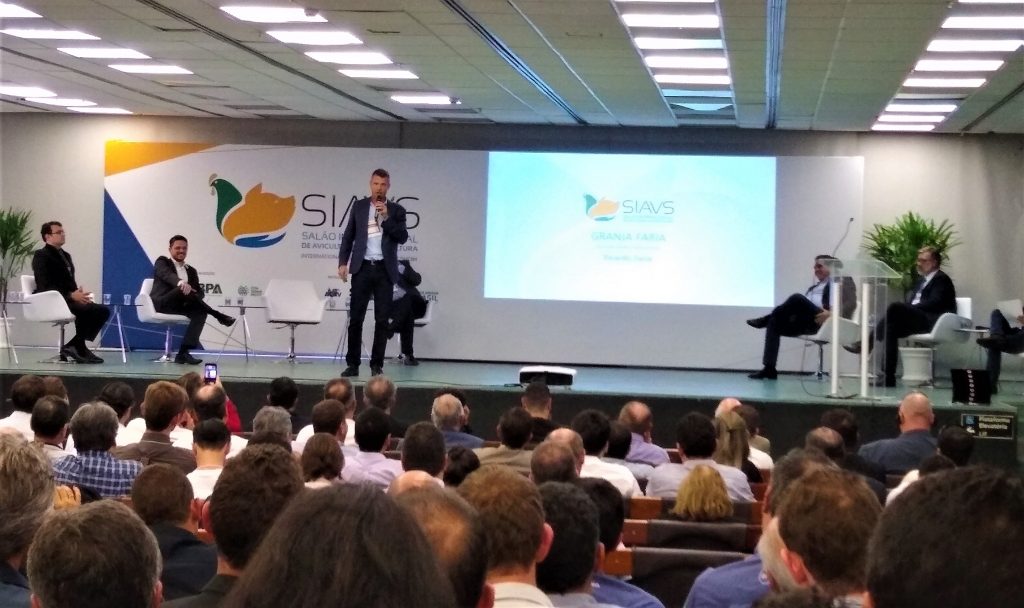São Paulo – On the opening day of the International Poultry and Pork Show (SIAVS), Brazilian egg industry representatives came together to discuss the relevance of exports and how to increase them.” Since Brazil’s poultry sector has secured a solid spot in the Middle East, we can hitchhike our way into that market,” Four Import Export trader Leonardo Guerini told ANBA. He joined the Ovosite Symposium this Tuesday (27) during the SIAVS Congress.
The event is running from August 27 to 29 in São Paulo, including a trade show and talks on the future of the productive sector. Guerini sat in the panel Strategies for boosting Brazilian egg exports. He was joined by Granja Mantiqueira founder Leandro Pinto, Somai Alimentos director Gustavo Crosara, Avícola Catarinense founder Ricardo Faria (pictured above, standing) and Bretas Broker CEO Redilton Bretas.
The speakers emphasized that the egg industry can learn from its chicken-centered counterpart. They said that having producers join forces under associations like ABPA is key – its Brazilian Egg project, in tandem with the Brazilian Trade and Investment Promotion Agency (Apex-Brasil), was also brought up as a tool for driving up foreign sales.
Guerini argued that the Middle East represents an opportunity to the Brazilian industry and must be treated as such. The region is Brazil’s biggest market, especially when it comes to white eggs. “Since we have a much bigger supply of white egg, and that’s what the Middle East wants, what you have is a win-win situation,” he said.
Relevant trends for the Brazilian industry include so-called specialty eggs. “The question of organic, Omega 3, cage-free egg – where the hens are free-range – will sooner or later become a basic requirement. If Brazil’s ready, it will dominate this market. If Brazil keeps waiting for others to step up to plate, it will be left at the end of the line,” said Guerini.
He conceded, however, that the industry must secure its place in raw eggs first. “We export 0.4% of our output, so first we need to learn to export raw eggs. Then we can take that second step. The market isn’t going to just sit and wait on Brazil. I believe that as the years go by, things change and needs increase. They’ll end up asking for the product before we expect them to,” he said.
Fertile eggs in the Arab countries
One of the points raised during the debate was the need to include exporting in the plan. For the producers who already operate abroad, the investment at the beginning was key to break into market. “This year, since the domestic market for fertile egg is great, we left USD 3.5 million to maintain exporting. This is not stock exporting, it’s the company’s motto to honor contracts. And signing three-, four-year contracts,” pointed out Ricardo Faria, supporting the bet on the foreign market as a long-term strategy.
Avícola Catarinense owns 16 farmhouses scattered around Brazil, and fertile eggs exports account for 40% of the company’s revenue now. The company has operated since 2016 with fertile eggs and the Arab countries are one of the main destinations of its product. “Approximately 50% of our fertile egg exports go to Oman, Saudi Arabia, Abu Dhabi, and Dubai,” Faria stressed to ANBA.
In turn, the market for commercial – non-fertile – eggs have only recently started being tapped by the poultry raiser. “We started roughly a year ago; it took some time to get permits and licenses and we started exporting five months ago. We export to the United Arab Emirates – Dubai and Abu Dhabi,” said the executive.
In sales to the Arabs, he explained that the focus for now are on the white eggs. Ricardo also pointed out the importance to be neutral, as Brazil has historically been, in order to strengthen the country’s economic relations. Now, the company ships ten tonnes of fertile eggs per day. Half of them is bound to the Middle East. “Imagine that I have to leave with an egg from the South of Santa Catarina and arrive with them 300 Km from Riyadh [capital city of Saudi Arabia] within five days,” illustrated Faria on the issue of the shipment. For fertile eggs, the company send its cargoes by air.
Focused on increasing the exports volume, Faria explains that he sees future markets in the Arab countries. “I believe Iraq is a promising country. And strengthening our exports volume to Dubai. We must come into the next year at least with 10% of our revenue from exports,” concluded the businessman.
Quick facts
Salão Internacional de Avicultura e Suinocultura
From 11 am to 7 pm – August 27 and 28
From 11 am to 5 pm– August 29
Parque Anhembi – Av. Olavo Fontoura, 1209, Santana – São Paulo
More info at: http://www.siavs.com.br/
Translated by Guilherme Miranda




